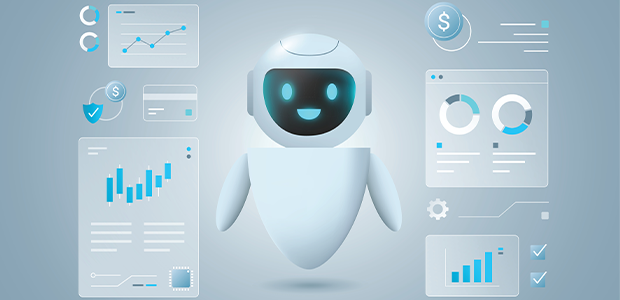
Beyond automation: why fintech’s AI future must remain human-centric
Artificial Intelligence (AI) is significantly changing the way small and medium-sized businesses manage their finances. In the UK, the number of SMEs adopting AI tools has increased 32-fold between 2022 and 2024, while average spending on AI tools has risen nearly sixfold over the same period. Once seen purely as a tool for automation, AI now plays a much more proactive role, helping businesses anticipate cash-flow gaps, prevent fraud, and deliver more personalised customer experiences.
As the technology becomes more embedded, one question looms large: how do we ensure that automation strengthens, rather than replaces, the human relationships at the core of financial services? The answer lies in designing AI to improve human decision-making. Forward-thinking fintechs are leveraging AI to build trust, enable inclusion, and prevent issues before they ever reach the customer. This shift, from reactive problem-solving to proactive service delivery, represents one of the most significant evolutions in digital finance.
At myPOS, we’re focused on designing AI to augment human decision-making, enabling our teams to intervene where empathy, context, or judgement is needed. For example, our AI flags unusual transactions in real-time, but instead of automatically blocking them, it alerts our human teams, who can access the situation and act with the right context.
From reactive to proactive: the new standard in trust
For decades, financial services have operated reactively: a transaction failed, then a customer called; fraud occurred, then an investigation began. AI makes it possible to reverse that logic. By analysing transactions in real time, algorithms can detect unusual patterns that may signal fraud or technical disruptions, allowing companies to act before the customer even notices a problem.
This proactive approach is becoming central to trust in the fintech industry, both in the UK and globally. It prevents disruptions, reduces disputes, and allows businesses to run more smoothly. The same principle now applies to onboarding, where document verification and compliance checks that once took days can now be completed in minutes with AI-assisted tools. When technology removes unnecessary friction, users feel more confident that their financial services will “just work”.
Augmenting, not replacing, human judgement
Although AI can process information faster and with more accuracy than any human, it lacks emotional intelligence. In fact, a survey found that nearly 70% of UK consumers say AI chatbots fail to understand emotional cues. While AI can identify anomalies in data, it cannot detect the frustration in a customer’s voice or the urgency behind a small business owner’s request. The future of fintech clearly depends on improving the speed and accuracy of human decision-making.
A common mistake organisations make when deploying AI is focusing on the wrong metrics. Success is often measured solely by “deflection rates,” or whether a bot resolves an issue without human intervention. This approach overlooks the true indicators of quality service: first-contact resolution, customer trust, and the likelihood that users will recommend the service. Prioritising these outcomes leads to AI supporting meaningful experiences rather than just reducing manual workload.
Ethics and transparency
As AI becomes a key driver of financial decisions, ethical responsibility must be treated as a core design requirement. The principles of fairness, explainability, and accountability need to underpin every aspect of an AI system, from data collection to deployment.
For example, transparent decision-making allows customers to understand why a transaction was flagged or a decision made, turning AI into a trust-building tool rather than a black box. At myPOS, for example, every on-device decision is explained and complimented by a “request human review” button. By clicking it, merchants are redirected to a live analyst within two business hours. Crucially, human oversight is needed to interpret AI outputs, make contextual judgments, and intervene when automated systems may misclassify or misrepresent a user’s situation. Ultimately, AI ethics is foundational to trust, which only humans can fully maintain.
A smarter relationship with customers
AI’s predictive capabilities are also changing the fundamental nature of customer relationships. Instead of responding to problems, fintechs can now anticipate them: identifying cash-flow gaps before they occur, suggesting actions to improve financial stability, or alerting users to potential risks early.
This proactive intelligence significantly enhances trust, shifting interactions from transactional to consultative. It empowers small and medium-sized businesses to make data-driven decisions that once required dedicated financial teams, while freeing human representatives to focus on higher-value conversations - those that demand empathy, judgment, and nuanced understanding.
Personal, prediction, and human
The next phase of fintech innovation will be defined by how seamlessly AI blends automation with personalisation. We’re already seeing the rise of conversational commerce, embedded payments, and tailored financial insights delivered directly at the point of sale. As these capabilities expand, so will expectations around transparency, accountability, and empathy in how AI operates.
The future of fintech is smarter, faster and human centric. AI will continue to handle the repetitive and reactive, but people will remain essential for what truly matters: understanding, trust, and connection. When businesses design AI around these core values – fairness, explainability, and empathy – the technology will strengthen the human relationships that keep the financial world moving.
For more startup news, check out the other articles on the website, and subscribe to the magazine for free. Listen to The Cereal Entrepreneur podcast for more interviews with entrepreneurs and big-hitters in the startup ecosystem.

